深圳初中英语教材语法点分布
- 格式:doc
- 大小:81.00 KB
- 文档页数:8
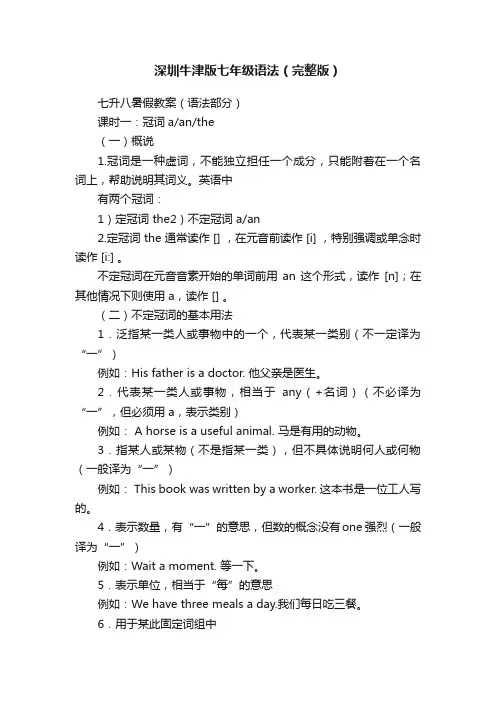
深圳牛津版七年级语法(完整版)七升八暑假教案(语法部分)课时一:冠词a/an/the(一)概说1.冠词是一种虚词,不能独立担任一个成分,只能附着在一个名词上,帮助说明其词义。
英语中有两个冠词:1)定冠词 the2)不定冠词 a/an2.定冠词 the 通常读作 [] ,在元音前读作 [i] ,特别强调或单念时读作 [i:] 。
不定冠词在元音音素开始的单词前用an这个形式,读作[n];在其他情况下则使用 a,读作 [] 。
(二)不定冠词的基本用法1.泛指某一类人或事物中的一个,代表某一类别(不一定译为“一”)例如:His father is a doctor. 他父亲是医生。
2.代表某一类人或事物,相当于any(+名词)(不必译为“一”,但必须用 a,表示类别)例如: A horse is a useful animal. 马是有用的动物。
3.指某人或某物(不是指某一类),但不具体说明何人或何物(一般译为“一”)例如: This book was written by a worker. 这本书是一位工人写的。
4.表示数量,有“一”的意思,但数的概念没有one 强烈(一般译为“一”)例如:Wait a moment. 等一下。
5.表示单位,相当于“每”的意思例如:We have three meals a day.我们每日吃三餐。
6.用于某此固定词组中例如: a few, a little, a bit (of), a lot of 等。
(三)定冠词的基本用法1.特指某(些)人或某(些)事物例如:Give me the book. 把那本书给我。
2.指谈话双方都知道的人或事物例如:Where is the doctor? 医生在哪儿?3.再次提到上文提到过的人或事物例如: I bought a dictionary yesterday. The dictionary is at home.昨天我买了一本词典。
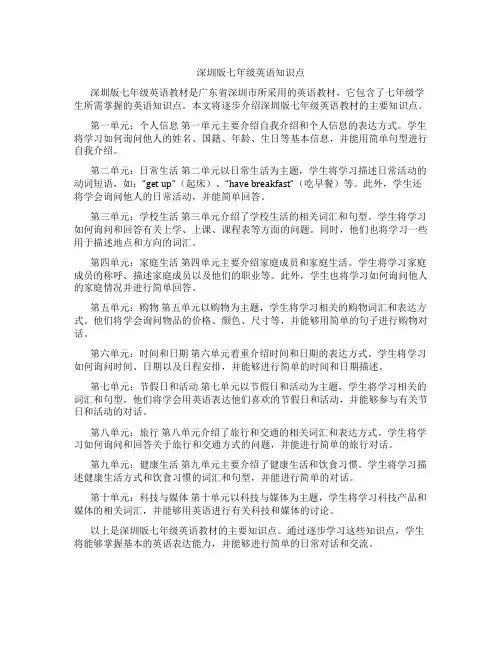
深圳版七年级英语知识点深圳版七年级英语教材是广东省深圳市所采用的英语教材,它包含了七年级学生所需掌握的英语知识点。
本文将逐步介绍深圳版七年级英语教材的主要知识点。
第一单元:个人信息第一单元主要介绍自我介绍和个人信息的表达方式。
学生将学习如何询问他人的姓名、国籍、年龄、生日等基本信息,并能用简单句型进行自我介绍。
第二单元:日常生活第二单元以日常生活为主题,学生将学习描述日常活动的动词短语,如:“get up”(起床)、“have breakfast”(吃早餐)等。
此外,学生还将学会询问他人的日常活动,并能简单回答。
第三单元:学校生活第三单元介绍了学校生活的相关词汇和句型。
学生将学习如何询问和回答有关上学、上课、课程表等方面的问题。
同时,他们也将学习一些用于描述地点和方向的词汇。
第四单元:家庭生活第四单元主要介绍家庭成员和家庭生活。
学生将学习家庭成员的称呼、描述家庭成员以及他们的职业等。
此外,学生也将学习如何询问他人的家庭情况并进行简单回答。
第五单元:购物第五单元以购物为主题,学生将学习相关的购物词汇和表达方式。
他们将学会询问物品的价格、颜色、尺寸等,并能够用简单的句子进行购物对话。
第六单元:时间和日期第六单元着重介绍时间和日期的表达方式。
学生将学习如何询问时间、日期以及日程安排,并能够进行简单的时间和日期描述。
第七单元:节假日和活动第七单元以节假日和活动为主题,学生将学习相关的词汇和句型。
他们将学会用英语表达他们喜欢的节假日和活动,并能够参与有关节日和活动的对话。
第八单元:旅行第八单元介绍了旅行和交通的相关词汇和表达方式。
学生将学习如何询问和回答关于旅行和交通方式的问题,并能进行简单的旅行对话。
第九单元:健康生活第九单元主要介绍了健康生活和饮食习惯。
学生将学习描述健康生活方式和饮食习惯的词汇和句型,并能进行简单的对话。
第十单元:科技与媒体第十单元以科技与媒体为主题,学生将学习科技产品和媒体的相关词汇,并能够用英语进行有关科技和媒体的讨论。
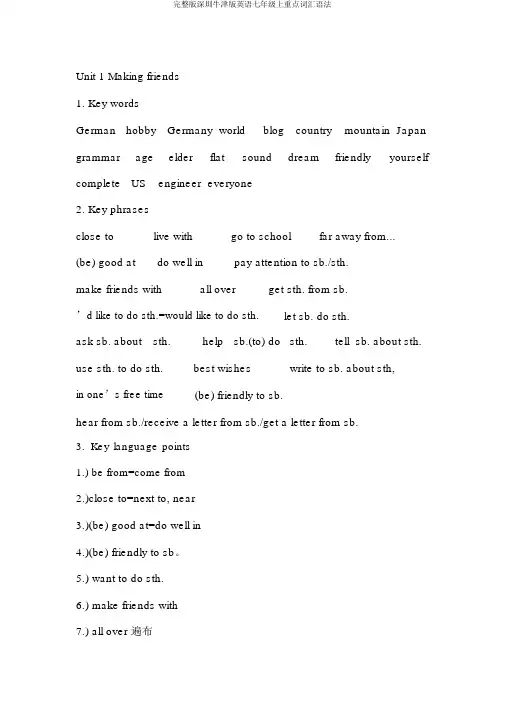
Unit 1 Making friends1. Key wordsGerman hobby Germany world blog country mountain Japan grammar age elder flat sound dream friendly yourself complete US engineer everyone2. Key phrasesclose to live with go to school far away from... (be) good at do well in pay attention to sb./sth.make friends with all over get sth. from sb.’d like to do sth.=would like to do sth.let sb. do sth.ask sb. about sth.help sb.(to) do sth.tell sb. about sth. use sth. to do sth.best wishes write to sb. about sth,in one’s free time(be) friendly to sb.hear from sb./receive a letter from sb./get a letter from sb.3.Key language points1.) be from=come from2.)close to=next to, near3.)(be) good at=do well in4.)(be) friendly to sb。
5.) want to do sth.6.) make friends with7.) all over 遍布8.)’d like to do sth=would like to do sth.would like sth.would like sb. to do sth.4.Key grammarA. 特别疑问句1.疑问词what where who how how old when why which whose what time(问时辰 )how long how far how soon多快how often how many how much2.特别疑问句组成:特别疑问词+一般疑问句B.不定冠词 a/anUnit 2 Daily life1. Key wordsdaily bell article ring never end table tennis band ride practice usually together so market seldom guitar Geography grade break start2. Key phrasesjunior high school on foot take part in have a good time go to bed get up talk about between A and B(be) late for school brush one’s teeth ride a bicycle make notes add sth. to sth.at the end of take turns to do sth.arrive at/inhelp sb. with sth.Keep a diary remember to do sth.enjoy/love doing sth.3.Key language points1.) enjoy(doing) sth.2.) love doing sth.3.) ride (rode ridden)4.) end v. /n.5.) practice n. practise v. practise doing sth.6.) (be) late for7.) on foot8.) go to bed去睡觉go to sleep睡着了4.Key grammarA. 一般此刻时1.当谓语动词为实义动词时:一定句、否认句、疑问句、回答2.当谓语动词为 be 动词时:一定句、否认句、疑问句、回答B.频度副词和副词短语的使用1、频度副词使用时一般放在动词前always usually often sometimes seldom never2、频度副词短语使用时一般放在句末every day once a week twice a week all the time five times a year at the weekend every day/night/year/month...一、一般此刻时:【No. 1】一般此刻时的功能1.表示事物或人物的特点、状态。
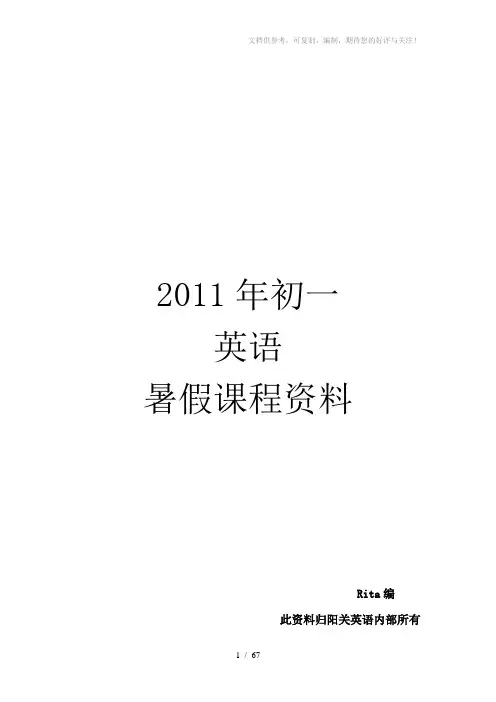
2011年初一英语暑假课程资料Rita编此资料归阳关英语内部所有语法篇语法一:句子成分课前15分:I have cities, but there are not any houses in them.I have forests, but not any trees in them.I have rivers, but there is not any water in them.What am I ? ___________一、句子的定义句子的定义:句子是包含主语和谓语部分的一组词。
它有一定的语法结构和语调,用以表达一个比较完整的独立的概念。
句子的各个组成部分叫做句子成分.句子是按照一定的语法规律组成的,表达一个完整的意义。
一个句子一般由两部分构成,即主语部分和谓语部分,这两部分也叫做句子的主要成分。
现代汉语里一般的句子成分有六种,即主语、谓语、宾语、定语、状语和补语。
英语的基本成分有七种:主语(subject)、谓语(predicate)、表语(predicative)、宾语(object)、定语(attribute)、状语(adverbial) 和补语(complement)。
句子成分是句子中起一定功用的组成部分。
1)主语:是一句的主体,是全句述说的对象,常用名词,数词或代词担任,一般放于句首。
如:Students study. (学生学习。
)We are friends.(我们是朋友)这两句话中单词students是个名词,we是代词,它们在句中做主语。
2)谓语:是对主语加以陈述,表示主语的行为或状态,常用动词或者动词词组担任,放在主语的后面。
如:Students study. (学生学习。
)We are friends. (我们是朋友)这两句话中单词study和are都是动词,study叫做实意动词,are叫做be动词,它们在句中作谓语。
3)宾语:表示行为的对象,常由名词或者代词担任。
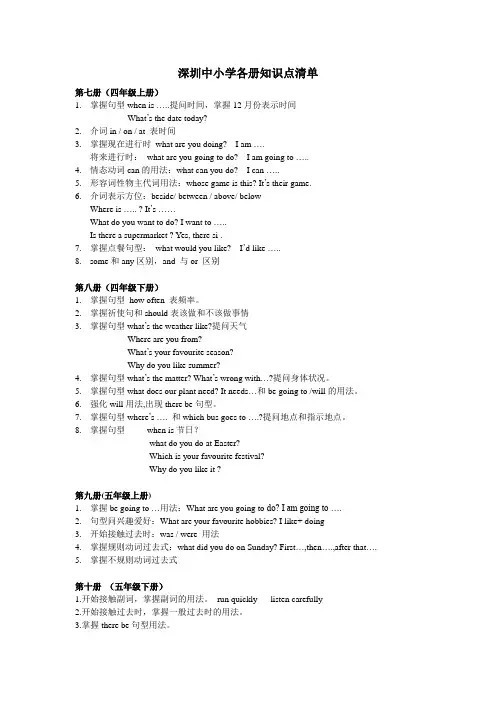
深圳中小学各册知识点清单第七册(四年级上册)1.掌握句型when is …..提问时间,掌握12月份表示时间What’s the date today?2.介词in / on / at 表时间3.掌握现在进行时what are you doing? I am ….将来进行时:what are you going to do? I am going to …..4.情态动词can的用法:what can you do? I can …..5.形容词性物主代词用法:whose game is this? It’s their game.6.介词表示方位:beside/ between / above/ belowWhere is ….. ? It’s ……What do you want to do? I want to …..Is there a supermarket ? Yes, there si .7.掌握点餐句型:what would you like? I’d like …..8.some和any区别,and 与or 区别第八册(四年级下册)1.掌握句型how often 表频率。
2.掌握祈使句和should表该做和不该做事情3.掌握句型what’s the weather like?提问天气Where are you from?What’s your favourite season?Why do you like summer?4.掌握句型what’s the matter? What’s wrong with…?提问身体状况。
5.掌握句型what does our plant need? It needs…和be going to /will的用法。
6.强化will用法,出现there be句型。
7.掌握句型where’s …. 和which bus goes to ….?提问地点和指示地点。

深圳初中英语教材语法点分布7上Unit 1 making friend 特殊疑问词中的疑问词、不定冠词a/an、连词and、but、soUnit 2 our daily life 一般现在时、频度副词Unit 3 troubles 一般过去时Unit 4 the world of numbers 祈使句、数词、数词用法Unit 5 beyond time and space 一般将来时Unit 6 beyond time and space 方位介词、不定代词7下Unit 1 travel 冠词(the)Unit 2 protecting our environment 现在进行时Unit 3 encyclopedia 指示代词的基本用法Unit 4 our senses 人称代词、物主代词、反身代词Unit 5 electricity 情态动词的用法Unit 6 poems about life 代词(whose、who、one、ones、that、those)8上Unit 1 water 不定数量词Unit 2 school newspaper 情态动词(should、ought to)、感叹句Unit 3 detectives and crimes 动词不定式、动名词Unit 4 computer and technology 形容词的比较级和最高级Unit 5 history stories 现在完成时Unit 6 fish story 副词(分类、位置、用法)Unit 7 traditional jobs 被动语态的时态8下Unit 1 memory 条件状语从句Unit 2 cartoons 形容词用法Unit 3 environment 疑问词面面观、形容词和副词的比较等级用法Unit 4 educational visits 目的状语从句、结果状语从句、让步状语从句Unit 5 success stories 过去进行时Unit 6 the adventures of Tom Sawyer 定语从句(关系代词、关系副词、主谓一致)Unit 7 family lives 直接引语变间接引语(人称、时态、代词(9全一册Unit 1 body language 零冠词的用法Unit 2 care for hair It is/was +adj+of/for so to do sth、adj+enough to do sthUnit 3 places of interest it的用法(形式主语、形式宾语)Unit 4 what should I do 过去完成时Unit 5 surprises at the studio 直接引语、间接引语Unit 6 food for thought have to,need to、that,what,how,when等引导的宾语从句Unit 7 a trip to the theatre 形容词后的宾语从句、特殊疑问词引导、that引宾语从句Unit 8 great minds 不定时的用法Unit 9 the weird world of plants 副词的比较级和最高级Unit 10 friend or enemy?不定式作状语,反意疑问句Unit 11 points of view 关系代词在定语从句的运用Unit 12 job hunting 复习状语从句。
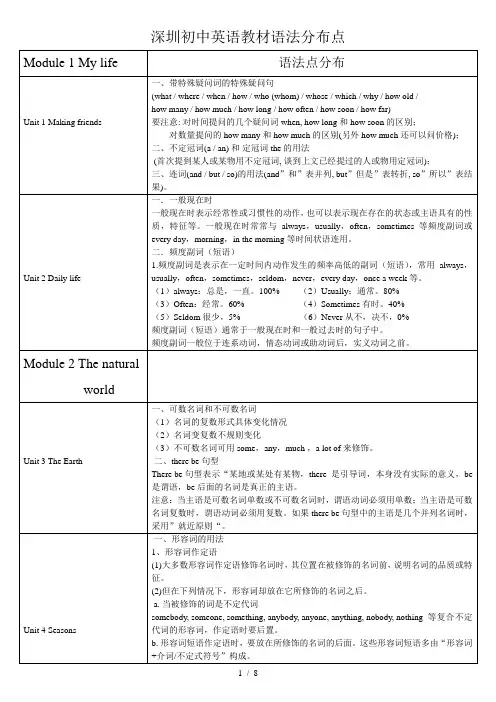
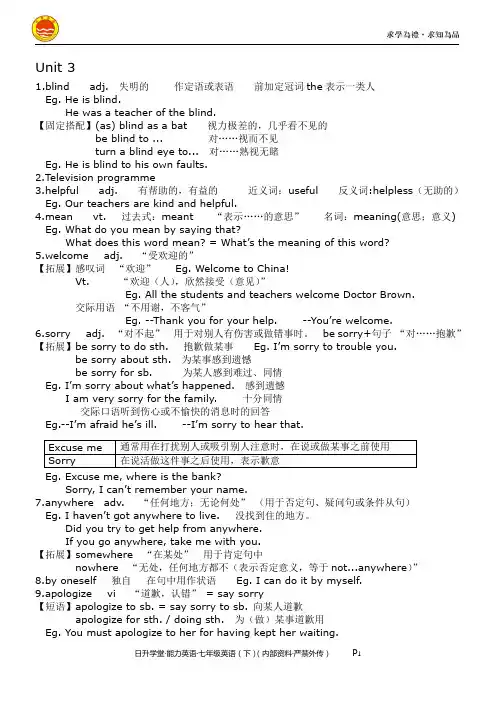
Unit 31.blind adj. 失明的作定语或表语前加定冠词the表示一类人Eg. He is blind.He was a teacher of the blind.【固定搭配】(as) blind as a bat 视力极差的,几乎看不见的be blind to ... 对……视而不见turn a blind eye to... 对……熟视无睹Eg. He is blind to his own faults.2.Television programme3.helpful adj. 有帮助的,有益的近义词:useful 反义词:helpless(无助的)Eg. Our teachers are kind and helpful.4.mean vt. 过去式:meant “表示……的意思”名词:meaning(意思;意义) Eg. What do you mean by saying that?What does this word mean? = What’s the meaning of this word?5.welcome adj. “受欢迎的”【拓展】感叹词“欢迎”Eg. Welcome to China!Vt. “欢迎(人),欣然接受(意见)”Eg. All the students and teachers welcome Doctor Brown.交际用语“不用谢,不客气”Eg. --Thank you for your help. --You’re welcome.6.sorry adj. “对不起”用于对别人有伤害或做错事时。
be sorry+句子“对……抱歉”【拓展】be sorry to do sth. 抱歉做某事Eg. I’m sorry to trouble you.be sorry about sth. 为某事感到遗憾be sorry for sb. 为某人感到难过、同情Eg. I’m sorry about what’s happened. 感到遗憾I am very sorry for the family. 十分同情交际口语听到伤心或不愉快的消息时的回答Eg.--I’m afraid he’s ill. --I’m sorry to hear that.Eg. Excuse me, where is the bank?Sorry, I can’t remember your name.7.anywhere adv. “任何地方;无论何处”(用于否定句、疑问句或条件从句)Eg. I haven’t got anywhere to live. 没找到住的地方。
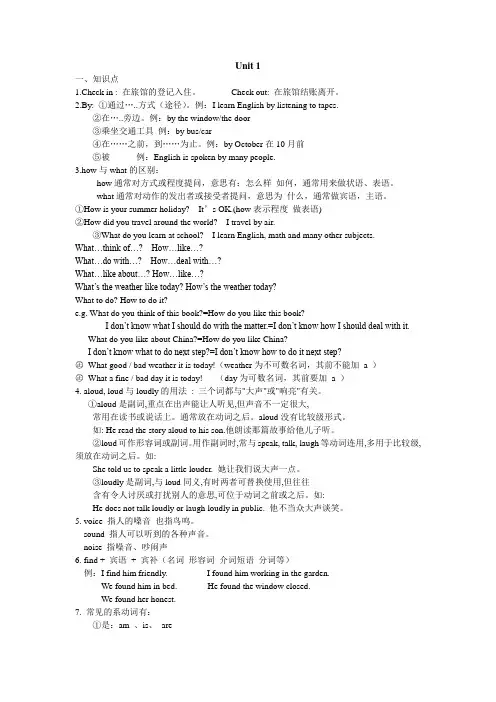
Unit 1一、知识点1.Check in : 在旅馆的登记入住。
Check out: 在旅馆结账离开。
2.By: ①通过…..方式(途径)。
例:I learn English by listening to tapes.②在…..旁边。
例:by the window/the door③乘坐交通工具例:by bus/car④在……之前,到……为止。
例:by October在10月前⑤被例:English is spoken by many people.3.how与what的区别:how通常对方式或程度提问,意思有:怎么样如何,通常用来做状语、表语。
what通常对动作的发出者或接受者提问,意思为什么,通常做宾语,主语。
①How is your summer holiday? It’s OK.(how表示程度做表语)②How did you travel around the world? I travel by air.③What do you learn at school? I learn English, math and many other subjects. What…think of…? How…like…?What…do with…? How…deal with…?What…like about…? How…like…?What’s the weather like today? How’s the weather today?What to do? How to do it?e.g. What do you think of this book?=How do you like this book?I don’t know what I should do with the matter.=I don’t know how I should deal with it.What do you like about China?=How do you like China?I don’t know what to do next step?=I don’t know how to do it next step?㊣What good / bad weather it is today!(weather为不可数名词,其前不能加 a )㊣What a fine / bad day it is today! (day为可数名词,其前要加 a )4. aloud, loud与loudly的用法: 三个词都与"大声"或"响亮"有关。
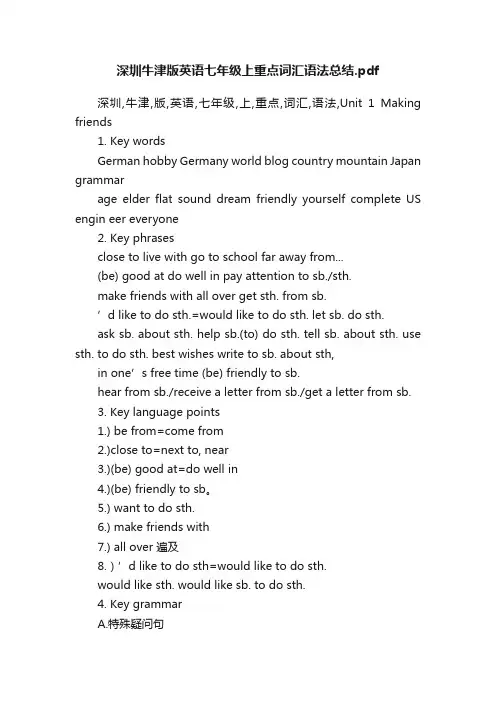
深圳牛津版英语七年级上重点词汇语法总结.pdf深圳,牛津,版,英语,七年级,上,重点,词汇,语法,Unit 1 Making friends1. Key wordsGerman hobby Germany world blog country mountain Japan grammarage elder flat sound dream friendly yourself complete US engin eer everyone2. Key phrasesclose to live with go to school far away from...(be) good at do well in pay attention to sb./sth.make friends with all over get sth. from sb.’d like to do sth.=would like to do sth. let sb. do sth.ask sb. about sth. help sb.(to) do sth. tell sb. about sth. use sth. to do sth. best wishes write to sb. about sth,in one’s free time (be) friendly to sb.hear from sb./receive a letter from sb./get a letter from sb.3. Key language points1.) be from=come from2.)close to=next to, near3.)(be) good at=do well in4.)(be) friendly to sb。
5.) want to do sth.6.) make friends with7.) all over 遍及8.)’d like to do sth=would like to do sth.would like sth. would like sb. to do sth.4. Key grammarA.特殊疑问句1.疑问词what where who how how old when why which whose what time(问时刻) how long how far how soon 多快how often how many how much2.特殊疑问句构成:特殊疑问词+一般疑问句B.不定冠词a/anUnit 2 Daily life1. Key wordsdaily bell article ring never end table tennis band ride practice usually together so market seld om guitar Geography grade break start2. Key phrasesjunior high school on foot take part in have a good time go to bed get up talk about between A and B (be) late for school brush one’s teeth ride a bicycle make notes add sth. to sth. at the end of take turns to do sth. arrive at/inhelp sb. with sth. Keep a diary remember to do sth. enjoy/love doing sth.3. Key language points1.) enjoy(doing) sth.2.) love doing sth.3.) ride (rode ridden)4.) end v. /n.5.) practice n. practise v. practise doing sth.6.) (be) late for7.) on foot8.) go to bed去睡觉 go to sleep睡着了4. Key grammarA. 一般现在时1. 当谓语动词为实义动词时:肯定句、否定句、疑问句、回答2. 当谓语动词为be动词时:肯定句、否定句、疑问句、回答B. 频度副词和副词短语的使用1、频度副词使用时一般放在动词前always usually often sometimes seldom never2、频度副词短语使用时一般放在句末every day once a week twice a week all the timefive times a year at the weekend every day/night/year/month...一、一般现在时:【No. 1】一般现在时的功能 1.表示事物或人物的特征、状态。
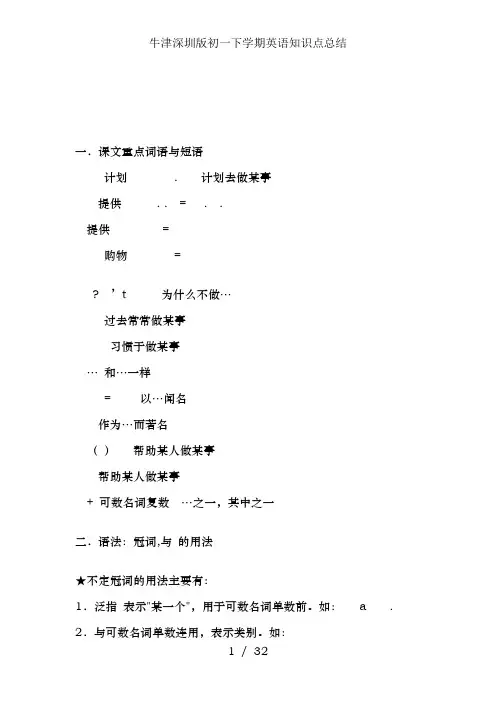
七年级上册:Chapter 1:特殊疑问词;不定冠词;连词Chapter 2:一般现在时Chapter 3:一般过去时Chapter 4:祈使句、数字的表达法Chapter 5:一般将来时Chapter 6:方位介词、限定词、不定代词七年级下册:Chapter 1:定冠词、专有以及非专有名词Chapter 2:现在进行时Chapter 3:指示代词、可数名词以及不可数名词Chapter 4:人称代词、形容词性物主代词以及名词性物主代词、反身代词Chapter 5:情态动词以及情态动词的否定Chapter 6:特殊疑问词和不定代词八年级上册:Chapter 1:可数名词和不可数名词、There be句型Chapter 2:情态动词ought to , should的用法;感叹句Chapter 3:动词不定式、动名词(非谓语动词)Chapter 4:形容词的比较级和最髙级Chapter 5:现在完成时Chapter 7:被动语态八年级下册:Chapter 1: if/unless引导的条件状语从句Chapter 2:形容词深入学习Chapter 3: why/because 的用法;as...as…的比较结构Chapter 4:目的/结果/让步状语从句Chapter 5:过去进行时Chapter 6:定语从句Chapter 7:间接引语九年级全一册:Chapter 1:零冠词;What kind (sort) of句式;学习定语Chapter 2:形容词的四种不同用法*It is adj. for sb to do sth*It is adj of sb to do sth*・・・enough to do sth*形容词的ing和ed形式Chapter 3: it 的用法可指时间、季节、天气或者距离也可以用做形式主语,代替后面的动词不定式或动名词还可以指代前面提过的的第三人称单数的物Chapter 4:过去完成时的基本结构和语法含义,还有标志词引导的让步状语从句Chapter 6: have to 和need to 的区别在know, think, believe等后面用that引导的宾语从句Chapter 7:带有特殊疑问词的宾语从句。
语法一:句子成分一、句子的定义句子的定义:句子是包含主语和谓语部分的一组词。
它有一定的语法结构和语调,用以表达一个比较完整的独立的概念。
句子的各个组成部分叫做句子成分.句子是按照一定的语法规律组成的,表达一个完整的意义。
一个句子一般由两部分构成,即主语部分和谓语部分,这两部分也叫做句子的主要成分。
现代汉语里一般的句子成分有六种,即主语、谓语、宾语、定语、状语和补语。
英语的基本成分有七种:主语(subject)、谓语(predicate)、表语(predicative)、宾语(object)、定语(attribute)、状语(adverbial) 和补语(complement)。
句子成分是句子中起一定功用的组成部分。
1)主语:是一句的主体,是全句述说的对象,常用名词,数词或代词担任,一般放于句首。
如:Students study. (学生学习。
)We are friends.(我们是朋友)这两句话中单词students是个名词,we是代词,它们在句中做主语。
2)谓语:是对主语加以陈述,表示主语的行为或状态,常用动词或者动词词组担任,放在主语的后面。
如:Students study. (学生学习。
)We are friends. (我们是朋友)这两句话中单词study和are都是动词,study叫做实意动词,are叫做be动词,它们在句中作谓语。
3)宾语:表示行为的对象,常由名词或者代词担任。
放在及物动词或者介词之后。
如:They are teachers. ( 他们是老师。
)I play with him. (我和他一起玩。
)这两句话中单词teachers是名词,单词him是带词,它们在句中作宾语。
4)定语:是用来说明或者限制名词的成分,常用形容词或者相当于形容词的短语或从句担任。
形容词放在名词之前,相当于形容词的短语或从句放在名词的后面。
如:This is a red sun.(这是个红太阳.)He is a tall boy.(他是个高个子男孩。
年级初一学科英语版本上海牛津版课程标题语法总结:MⅠ& MⅡ编稿老师戴丹丹一校林卉二校黄楠审核张丽丽一、学习目标复习总结:1. Wh-question的用法;2. 一般现在时,频度副词和频度副词式短语;3. 可数名词和不可数名词;4. there be句型;5. 形容词的用法。
二、重点、难点1. Wh-question的用法;2. 一般现在时,频度副词和频度副词式短语。
三、考情分析在中考说明中,本课的考试要求如下:第9条:理解并能区别所学的可数名词和不可数名词。
第10条:熟练掌握所学可数名词复数形式的构成及用法。
第30条:熟练掌握形容词作定语、表语及宾语补足语的用法。
第40条:熟练掌握一般现在时的构成和基本用法。
第52条:掌握五个简单句和there be 句型的基本用法。
第54条:理解一般疑问句、特殊疑问句和选择疑问句的构成和基本用法。
1. 【教材原句】What is her name?【概念】Wh-question的构成及用法。
【用法】特殊疑问句是用来对句子某一部分提问的疑问句。
疑问词出现在句首,后接不完整的一般疑问句。
句末通常用降调来读。
1. what ―什么‖(对―事,物‖提问;对职业提问。
)2. who ―谁‖(对―人‖提问。
)3. which ―哪个‖(既可以对―人‖提问,也可以对―物‖提问。
)4. whose ―谁的‖(对物主提问。
)5. when ―什么时候‖(对时间提问。
)6. why ―为什么‖(对原因提问。
)7. where ―在哪里‖(对地点提问。
)8. how ―怎样‖(对方式,程度,状态等提问。
)9. how many ―多少‖(对可数名词的复数提问。
)10. how much ―多少‖(对不可数名词提问,对价格提问。
)11. how long ―多长‖(对时间段或物体的长度提问。
)12. how soon ―多久‖(对―in+时间段‖提问。
)13. how often ―多久一次‖(对频率提问。
牛津深圳版初中英语各年级语法点分布.d o c(总1页)--本页仅作为文档封面,使用时请直接删除即可----内页可以根据需求调整合适字体及大小--牛深语法点分布7上Unit 1 making friend 特殊疑问词中的疑问词、不定冠词a/an、连词and、but、soUnit 2 our daily life 一般现在时、频度副词Unit 3 troubles 一般过去时Unit 4 the world of numbers 祈使句、数词、数词用法Unit 5 beyond time and space 一般将来时Unit 6 beyond time and space 方位介词、不定代词7下Unit 1 travel 冠词(the)Unit 2 protecting our environment 现在进行时Unit 3 encyclopedia 指示代词的基本用法Unit 4 our senses 人称代词、物主代词、反身代词Unit 5 electricity 情态动词的用法Unit 6 poems about life 代词(whose、who、one、ones、that、those)8上Unit 1 water 不定数量词Unit 2 school newspaper 情态动词(should、ought to)、感叹句Unit 3 detectives and crimes 动词不定式、动名词Unit 4 computer and technology 形容词的比较级和最高级Unit 5 history stories 现在完成时Unit 6 fish story 副词(分类、位置、用法)Unit 7 traditional jobs 被动语态的时态8下Unit 1 memory 条件状语从句Unit 2 cartoons 形容词用法Unit 3 environment 疑问词面面观、形容词和副词的比较等级用法Unit 4 educational visits 目的状语从句、结果状语从句、让步状语从句Unit 5 success stories 过去进行时Unit 6 the adventures of Tom Sawyer 定语从句(关系代词、关系副词、主谓一致)Unit 7 family lives 直接引语变间接引语(人称、时态、代词(9全一册Unit 1 body language 零冠词的用法Unit 2 care for hair It is/was +adj+of/for so to do sth、adj+enough to do sth Unit 3 places of interest it的用法(形式主语、形式宾语)Unit 4 what should I do 过去完成时Unit 5 surprises at the studio 直接引语、间接引语Unit 6 food for thought have to,need to、that,what,how,when等引导的宾语从句Unit 7 a trip to the theatre 形容词后的宾语从句、特殊疑问词引导、that引宾语从句Unit 8 great minds 不定时的用法Unit 9 the weird world of plants 副词的比较级和最高级Unit 10 friend or enemy 不定式作状语,反意疑问句Unit 11 points of view 关系代词在定语从句的运用Unit 12 job hunting 复习状语从句。
七年级上册语法(牛津深圳版)第一单元 1.带疑问词的疑问句(特殊疑问句) 2.不定冠词 3。
连词第二单元 1.一般现在时态 2.表频率的副词和副词短语第三单元 1.一般过去时态 2.表示过去的时间第四单元 1.比较句型 2.关于数字的一些表达和陈述 3.基数词和序数词第五单元 1.一般将来时态 2.表示将来的一些时间词第六单元 1.方位介词 2.some 和 any 3.不定代词七年级下册语法(牛津深圳版)第一单元 1.定冠词the 2.专用(有)名词第二单元 1.现在进行时态 (1).谈论现在发生的事情(2)谈论将来发生的事情第三单元 1.指示代词this that these those 2.可数名词和不可数名词第四单元 1.人称代词 2.形容词性物主代词和名词性物主代词 3.反身代词第五单元 情态动词(1)can 和 cannot (2)may 和 may not (3) must 和 must not 第六单元 1.who和whose的使用 2.one 和 ones 的使用八年级上册语法(牛津深圳版)第一单元 谈论数量第二单元 1.情态动词should 和 ought to 2. 感叹句第三单元 不定式和动名词第四单元 1.形容词的比较级,最高级 2. 特别的形容词的比较级和最高级第五单元 现在完成时态第六单元 副词第七单元 被动语态八年级下册语法(牛津深圳版)第一单元 if/unless的条件状语从句第二单元 形容词的用法(三种成分两个句型)第三单元 why提问的疑问句,表达比较的句型(几个词组)第四单元 1.目的状语从句2.结果状语从句3.让步状语从句第五单元 过去进行时态第六单元 who,which,that引导的定语从句第七单元 1.转述别人所说的话2.转述我们所阅读到的东西(直接引语,间接引语)九年级全一册语法(牛津深圳版)第一单元 零冠词 ,用what kind/sort of提问第二单元 形容词的使用1.it is + adj.for/of + noun/pronoun + to do2.enough to do3.ing结尾的形容词和ed结尾的形容词的区别第三单元 it作形式主语第四单元 过去完成时态(1.过去某个时间前的动作2.过去的较早和较迟的动作)第五单元 转述陈述句,转述疑问句,转述祈使句第六单元 1.have to 与 need to 的使用2.在know,think,believe等后面有that引导的宾语从句第七单元 1.疑问词引导的宾语从句2.后接表语形容词的that引导的宾语从句第八单元 1.名词后的不定式 2.疑问词后的不定式第九单元 1. 副词的比较级和最高级 2.用(not)as … as 作比较第十单元 1.把带to的不定式用作副词来表示目的2.反意疑问句第十一单元 1.make和let后面用不带to的不定式2.be动词后的不定式(作表语的不定式来解释be前的名词第十二单元 状语从句(复习)(时间,条件,比较,目的,结果,让步,原因状语从句)。